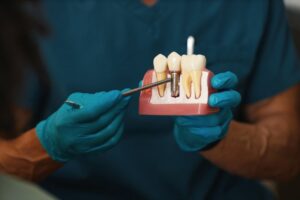
Dental implants are a game-changer when it comes to restoring your smile and overall oral health. However, though they’re artificial, they need the same amount of attention that natural teeth do to ensure they stay in top condition. Understanding the ins and outs of caring for your implants will help you enjoy success after their implementation. Read on to learn some do’s and don’ts in looking after your new additions.
Do Practice Smart Oral Hygiene
Care for your implants the same way you would natural teeth. Brushing and flossing your teeth daily is the first line of defense in the fight against plaque and tartar buildup that causes tooth decay and gum disease. Rinse with an antibacterial mouthwash to help prevent infection.
Also, plan to make at least two trips per year to the dentist for professional hygiene. Biannual checkups are important as they’ll alert your dentist to any issues with the implants that may arise.
Do Eat a Good Diet
There are some things you’ll want to stick to and some you’ll want to avoid when it comes to what you eat and drink:
- Hard foods: Hard foods like nuts, jerky, and raw vegetables should be approached with care. Cut these foods into bite-size pieces to avoid taking a direct bite of the hard exterior.
- Stay hydrated: Drinking plenty of water is not only good for your overall health, it optimizes saliva production, a crucial element in protecting your teeth.
- Sugar and starch: You’ll want to limit your sugar and starch consumption. Foods rich in these qualities create acids that eat at tooth enamel.
Do Rest
Clearing your schedule on the day of your treatment will allow you to get the rest your body needs to recover. Have a trusted friend or family member give you a ride home and keep an eye on you for a while. Lie on your back and keep your feet propped to ensure the flow of blood to your head; this helps swelling go down and prevents any excessive bleeding.
Don’t Quickly Return to Normal Foods
Soft foods rich in vitamins should be the focus of your diet after getting implants, like boiled vegetables, low-sodium soups, yogurt, and mashed potatoes. These foods are loaded with vitamins A and C, which should help speed up your recovery.
You’ve just been through oral surgery, so be gentle with your teeth! Avoid too much spice and sticky, hard, or crunchy foods. Also, avoid using straws – the sucking motion can disrupt the blood clots around the implant site and cause intense pain and bleeding.
Don’t Overdo It
Pumping iron or running miles the day after your oral surgery is a bad idea; neither is going back to work if it’s a physically intensive job. Any strenuous activity could increase bleeding and swelling in the implant site and take the body’s focus away from healing.
Dental implants take time to fuse with the jawbone in a process called osseointegration – too much activity can disrupt this, leading to a failed implant.
Don’t Smoke or Drink Too Much Alcohol
Smoking of any type disrupts the recovery process and increases the chances of your implants failing. If you’re a current smoker, avoid smoking the day of the implant.
Patients should also refrain from drinking alcohol for at least 24 hours after the operation. Alcohol can impact recovery and could interfere with any post-op pain medication that the dentist may have prescribed you.
Like any big investment, you want to take care of it, so follow this guide for successful dental implants to keep your new smile looking beautiful!
About the Author
Dr. Roshan Shroff is a graduate of the University of Colorado School of Dental Medicine and is trained to restore your oral health with implants and tend to your aftercare. He and his team of dedicated professionals in Centennial can see to your smile restoration with natural-looking porcelain veneers, a gentle and caring dental team, and treatment planning with a digital impression scanner. Call their office today at (303) 632-3622 or visit them online to make your appointment.
